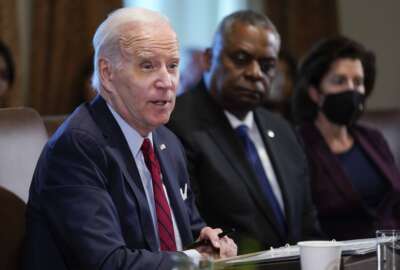Small businesses say work will continue in shutdown
A survey from Small and Emerging Contractors Advisory Forum finds more than half of their respondents will conduct business as usual if the agencies stop working.
wfedstaff | June 3, 2015 11:25 pm
By Jason Miller
Executive Editor
Federal News Radio
Small businesses should have contingency plans in place in preparation for stop work orders on their contracts.
Funding for the federal government runs out Saturday, April 9 at 12:01 a.m., and agencies are readying notices to all contractors telling them to stop non-essential work.
The issuing of stop work orders would send many small firms down a tough road, said Bob Dinkel, managing director at Pierce Capital Partners and board member of the Small and Emerging Contractors Advisory Forum (SECFA).
“It could have devastating effect on small businesses from a cash flow and payment perspective,” Dinkel said. “Hopefully small businesses have been taking precautions such as having a credit line in place.”
SECFA asked their members how they are preparing for a shutdown. About 40 members responded.
- 55 percent of respondents say in the event of a government shutdown it will be business as usual
- 38 percent of respondents say they will ask employees to use personal leave during the shutdown.
- 14 percent of respondents said they would send employees to training with time and costs paid by the company and
- 5 percent said they would be forced to dock pay across the board for all employees.
Dinkel said he wasn’t surprised that so many companies believe it will be business as usual.
“When you look at different areas of government shutting down, many segments in the technology area, where many of our members work, are probably deemed in the essential segment, such as homeland security, law enforcement support and air traffic control,” he said. “These are segments that must go on.”
He added that when the government shutdown in 1995-96 contractors opted to pay for employee training instead of a furlough or forced use of leave.
Small firms should have a pretty good idea where their contracts fall and whether there is funding for them.
Dinkel said subcontracts are another concern. The flow down from large companies can be unclear so small firms should talk to the prime contractors to find out more about the job.
Dinkel also warned that other initiatives such as bid protests or developing bids on a deadline don’t get extensions.
“Small businesses should have the right contingencies in place asking simple questions such as what happens if contracts shut down, what are your alternatives, what will happen to your employees, it’s all part of a management plan,” he said.
He recommends small businesses develop their contingency plans, talk to employees and if needed, find help in the business community from organizations like SECFA and others.
(Copyright 2011 by FederalNewsRadio.com. All Rights Reserved.)
Copyright © 2025 Federal News Network. All rights reserved. This website is not intended for users located within the European Economic Area.





